It's something you might not think about often. The dishwasher exists to make dirty dishes sparkling and sanitized; how could something designed to clean get dirty? But it happens, and our large appliances are bound to need upkeep to function well. Just like cleaning out the refrigerator when leaving for vacation, the dishwasher might need some thought before you take off as well. Should you keep the dishwasher door open while you're away? We've researched for you and have some excellent information.
If leaving home for an extended period, it is best to leave the dishwasher door slightly ajar. This allows any remaining moisture to evaporate. By keeping the inside of this important appliance dry, it prevents lime deposits, bacteria, even mold from building up and creating an unsanitary environment. Afterall, a dirty dishwasher is not the kind of environment in which to clean dishes.
Though it's important not to leave standing water and excessive moisture closed up inside the dishwasher, there are a few caveats that bear discussing. Let's discuss what happens in a moist environment, as well as the proper way to keep your dishwasher working as well as the day it was purchased. Keep reading!

Dishwashers and Moisture
As mentioned above, when your home is left unattended for some time, it's best to leave the dishwasher door open to ensure any lingering heat and moisture can escape. Heat and moisture are a nightmare combination for most homeowners as they are the perfect combination to create unhealthy living conditions.
Because of this, not only is it good to leave the dishwasher door open when leaving for extended periods, but it's also advisable to leave the door ajar for a good half hour after each cycle. Not only will this help the health of your machine, but it'll also ensure your dishes are fully dry before putting them away.
Why are heat and moisture so bad? The villains in this story are mainly limescale, bacteria, and mold.
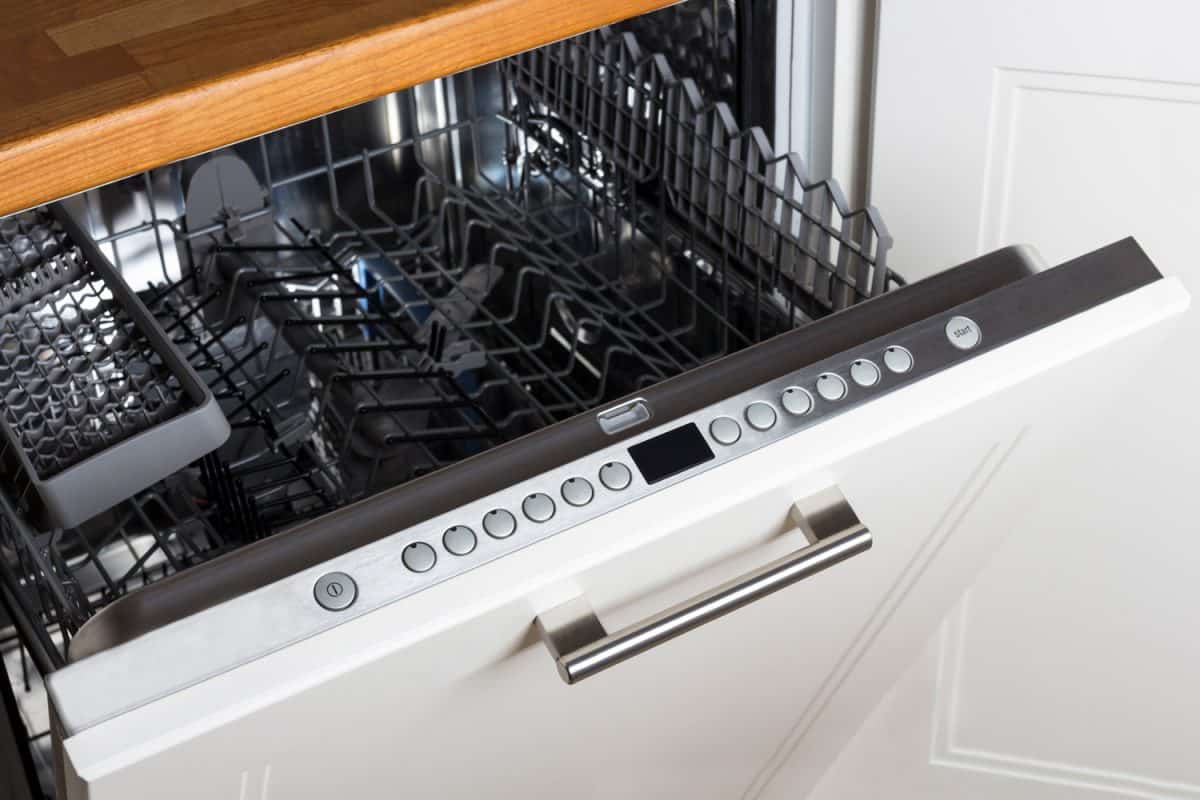
Limescale
Limescale is that yucky white coating you see on any fixtures frequently exposed to water. It is the result of excess calcium in water that builds up over time. It isn't necessarily a hazard to your health (not that you should go consuming limescale) but can create all sorts of other problems, such as blockages that restrict water flow.
If your dishwasher has an excessive amount of limescale, it will be obvious in its poor performance. Ensuring the dishwasher dries in between washes and remains frequently used can help prevent this build up.
Cleaning the inside helps as well. Not only does limescale affect performance, but it can also create the perfect surface for harmful bacteria, which leads to our next topic.
Bacteria
There are microorganisms on pretty much any surface that gets wet. This on its own isn't necessarily a scary fact. The only health risk that comes into play is how much bacteria can grow and cling to the surfaces inside the dishwasher.
Keeping the inside dry when not in use and using the heated dry function when running a cycle keeps the bacteria to a minimum. Always pay special attention to cleaning the rubber seals of your dishwasher as these are the places bacteria like to hang out the most.
To help your dishes dry faster, using a rinse aid like Jet-Dry comes in handy.
Mold
Mold is something we all want to avoid unless we're talking about antibiotics. No one wants a build-up of mold or mildew in their house, especially not in a place we trust to sanitize the plates and forks we eat with.
Unfortunately, a dishwasher is a great place for mold to grow with all the hot, moist heat that hangs out inside of it. Mold can produce spores in the air, aggravating people's allergies, asthma, or even cause prolonged health issues.
Battling the mold can be done easily by letting the dishwasher air out and keeping up with periodic cleaning of the inside. Save yourself a headache and keep the door cracked, especially when heading out on an extended absence.
Standing Water
Above, we discussed several results of standing water, but what about the water itself? This isn't something fun to hear, but standing water is also a major attractant for insects and rodents.
Mosquitoes breed in standing water. Imagine being away from home for a week and finding mosquitoes in the dishwasher! Save yourself the headache and make sure it's squeaky clean, slightly ajar, and dry before leaving.
What happens if you don't use your dishwasher?
Leaving your dishwasher unused for long periods can cause a wealth of problems. Not only might you get a build-up of limescale, bacteria, or mold, you might also find it won't run or seal anymore.
Prolonged periods of dryness can make the rubber seals dry and crack, the motor stall, and metal parts rust. All the build up inside has the potential of making you or your family ill. It's important to run your dishwasher now and again to keep it in tip-top shape.
To read more about what happens if you don't use your dishwasher, check out our article, "Do Dishwashers Break if not Used?"
How do I leave my dishwasher for 6 months?
The most important step in preparing to leave your dishwasher for six months is to thoroughly clean it first. Scrub the inside, the racks, the sprayers, the seals. Clean the outside just as thoroughly, including ensuring any pumps or hoses aren't holding water. Clean the filter and any detergent dispensing parts.
Make it as clean as it was before its first use. Leave it open to air dry for a few hours. All the way open - not just cracked. Once you're satisfied it's fully dry, be sure to leave the door cracked upon leaving just to ensure nothing was missed.
Clean the dishwasher just as thoroughly upon your return before using it again. If at all possible, don't leave your dishwasher to sit for extended periods. If you have any other option, use it. Even taking careful steps the life of your dishwasher can't be guaranteed if it's just left to sit.
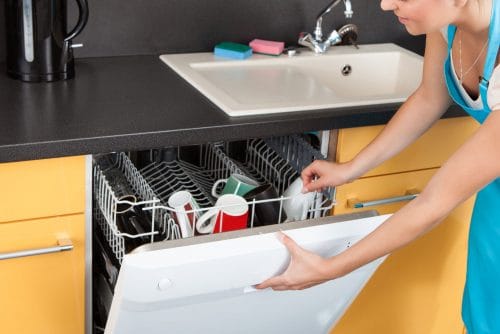
How long can a dishwasher be left unused?
If at all possible, don't leave your dishwasher unused for more than two to three weeks. If it's left for this amount of time or longer, thoroughly clean the appliance before using it.
It's been suggested to leave bleach or bleach water in an unused dishwasher to keep the insides moist and prevent the rubber seals from drying out, but we don't recommend leaving bleach on any surface for an extended time. This can affect the integrity of the surface.
How do you clean a dishwasher that hasn't been used for a long time?
To clean a dishwasher left unused for long periods, it's best to use a solvent that will kill any bacteria, mold, or mildew that has been allowed to build up. These solvents are easily mixed up at home with things you likely already have handy. We recommend using a distilled white vinegar or bleach solution to give the inside a thorough wipedown.
Don't use bleach if any parts of your dishwasher are stainless steel! When in doubt, use vinegar for the metal parts and use a bleach solution for the rubber parts. Use a toothbrush to get all the gunk from the smaller fixtures or tracks, as well as in the filter and dispenser areas. A sponge or microfiber cloth works great for wiping down the rest.
For mixing a vinegar solution, use a 1:1 ratio. Bleach is much more diluted, so we recommend about 2 tablespoons per 2 cups of water.
You can also use dishwasher cleaners which are an easy way to sanitize the inside if you're running short on time.
View this dishwasher cleaner on Amazon.
In Closing
If it's time for a vacation, remember your prep work. It doesn't stop at packing your bags. A simple step can help the longevity of your appliance, as well as keep your family healthy. Take a moment to crack open that dishwasher door and save yourself a lot of stress once you've returned.
We have tons more information on dishwashers here at kitchenseer.com. Check out our post about energy efficiency dishwashers because we all want to know we're not hurting our environment.

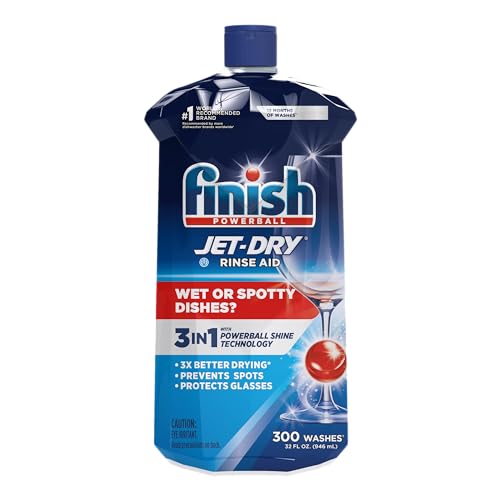

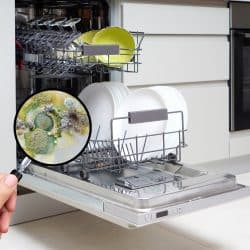

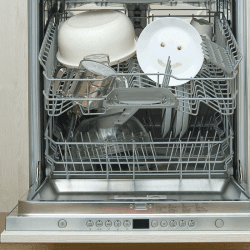
![Woman cleaning the inside wall of a fridge, How To Clean Mold From Fridge [Inc. Seal]](https://kitchenseer.com/wp-content/uploads/2022/06/Woman-cleaning-the-inside-wall-of-a-fridge-250x250.jpg)

